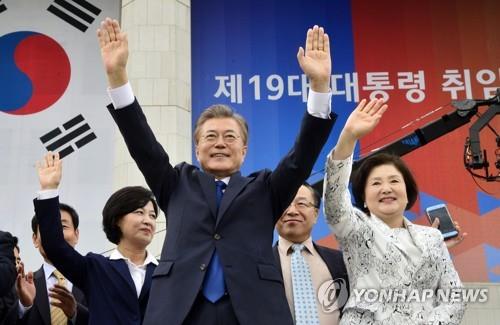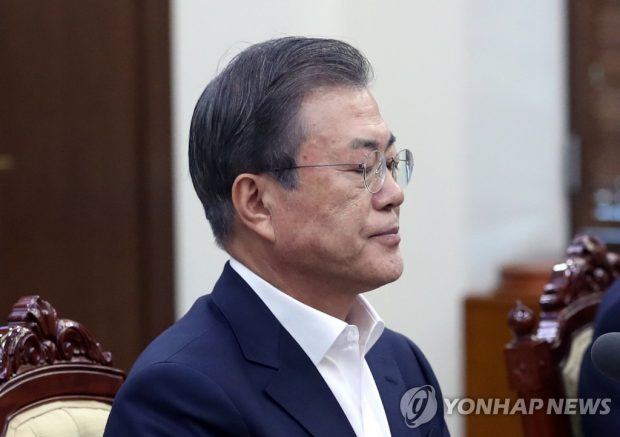Halfway into term, Moon desperate for renewed vigor in turbulent presidency

President Moon Jae-in and first lady Kim Jung-sook wave after his inauguration ceremony at the National Assembly on May 10, 2017. (Yonhap)
Seoul: On the threshold of the latter half of his single five-year tenure, President Moon Jae-in sets his sights on bringing hope back to the minds of the people here, who still long for inter-Korean peace and South Korea’s political and social reforms.
He often said his liberal administration was born with what he calls a “candlelight revolution.” Sworn in as the first and only successor of an impeached president in the country’s modern history, Moon pledged to transform South Korea into a country of “equal opportunity, a fair process and righteous result.”
Moon’s presidency got off to an enthusiastic start, with his popularity hovering around 80 percent.
The government made a strong pitch for the campaign to get rid of “deep-rooted evils.” The two former presidents — Park Geun-hye and Lee Myung-bak — were jailed on corruption charges.
Moon also offered constant overtures to Pyongyang, highlighted by his signature Berlin peace speech in July 2017. He declared that he was “taking the driver’s seat” on the Korean Peninsula issues.
His peace initiative paid off. North Korea dispatched a delegation to the 2018 PyeongChang Winter Olympics, heralding a “spring” on the peninsula.
Moon met twice with the North’s leader Kim Jong-un at the border village of Panmunjom, laying the groundwork for a historic summit between the communist nation and the United States in Singapore on June 12 last year. Moon’s Democratic Party won a landslide victory in local elections held a day after the meeting between Kim and U.S. President Donald Trump.
Moon had another summit with Kim in Pyongyang, where the two Koreas signed a comprehensive military agreement aimed at easing tensions, especially around the Demilitarized Zone (DMZ). The Moon administration talked openly about declaring a formal end to the 1950-53 Korean War.
But the Korea peace process has reached an impasse since the no-deal Hanoi summit between Trump and Kim early this year.
Moon has since endeavored to broker or facilitate denuclearization talks, but Pyongyang is rather bypassing Seoul. The North has resumed provocations, test-firing missiles or other upgraded rockets a dozen times for nine months through the end of October.
Hope for denuclearization and permanent peace have been dimming, as Moon’s peace drive has apparently lost steam.
Another dilemma for Moon is an obligation to move abreast with the U.S. in pushing for inter-Korean economic cooperation amid tough United Nations sanctions on Pyongyang.
A drawn-out slowdown in South Korea’s economic growth is also taking a toll on Moon’s popularity.
Its third-quarter growth dipped to 0.4 percent in the wake of a 1 percent rise in the three months to June this year, according to the Bank of Korea. It means a high possibility that Asia’s fourth-largest economy will grow below 2 percent in 2019.
Publicly, Moon pointed out negative effects from external headwinds, including a Washington-Beijing trade war.
Critics, however, take issue with his major economic policies, such as the income-driven growth strategy and the expansion of a 52-hour workweek system. Housing prices in Seoul have skyrocketed, and the overall youth jobless rate is on a steady increase, while the birthrate is continuing to drop.
Seoul’s relations with Tokyo are at one of the lowest ebbs since they normalized diplomatic ties in 1965. Even the hard-won bilateral accord on exchanging military information is slated to be terminated on Nov. 22.
A trade fight, which Japan initiated in early July, briefly helped Moon solidify his public support base to some extent.
Moon’s controversial pick of Cho Kuk as justice minister in the Aug. 9 Cabinet reshuffle has dealt a far more serious blow to his leadership.
Many people were disappointed by a flood of news reports on alleged irregularities involving Cho’s family largely in connection with his daughter’s “privileged schooling” and his wife’s questionable investment in a private equity fund.
Moon, however, pressed ahead with the appointment of Cho, one of his closest aides, citing the urgency of implementing the law professor’s far-reaching prosecution reform plans.
It prompted massive weekend street rallies in Seoul against Cho, while supporters of Moon also had their own candlelight vigils again, calling for reforming the prosecutors’ office first.
As a number of people grew restless, Moon’s job performance rating plunged to near 40 percent in October, according to multiple polls.

With his eyes closed, President Moon Jae-in attends a Cheong Wa Dae meeting in Seoul with his senior aides on Oct. 14, 2019, shortly after Justice Minister Cho Kuk announced a decision to quit. (Yonhap)
Speaking soon after Cho’s Oct. 14 announcement of his decision to step down, Moon offered a public apology.
“I am very sorry, as a result, for having caused a lot of conflicts,” he said.
Addressing the National Assembly a week later, the president vowed a full-scale push for education and prosecution reform with a focus on promoting “fairness.” He used the word “fairness” 27 times in his 33-minute address, primarily intended to explain the government budget for 2020 and fiscal policy. Many recalled his inauguration speech 2 1/2 years earlier with a similar message.
He added he would plow ahead with plans for a “peace economy, (and) innovative and inclusive growth.”
The president called on the polarized parliament to pass key pending bills on revitalizing the economy and reforming the prosecutors’ office: one to establish an investigative agency to probe corruption among high-ranking public officials and another to grant more investigative authority to the police.
Apparently, Part II of Moon’s presidency is getting off to a rocky start. North Korea has set a year-end deadline for a nuclear deal with the U.S. and inter-Korean ties appear to keep waning, as symbolized in the fanless, broadcastless and scoreless World Cup qualifying football match between the two sides in the North’s capital on Oct. 15.
There’s no clear sign yet of recovery in Seoul-Tokyo relations. Ideological rifts go on at home. Expectations for Moon’s accomplishments are apparently waning.
With his presidency at a crossroads, Moon seems to have not much time to start afresh. He’s banned from seeking reelection under the Constitution.
The coming few months will be crucial in defining how his presidency will be recorded in history. Moon has less than half a year before the April 15 general elections, the de facto midterm polls for him.
If the ruling party is defeated, Moon risks becoming an early lame duck. Hopes and chances of major reforms through legislation would get slimmer. The election results will decide the mood of his third inauguration anniversary.
One of the first important tests will be whether the ruling party will get the fast-tracked electoral and prosecution reform bills passed within this year.
Voters will monitor economic data, as the president has stressed that it takes time for economic policies to bear fruit. They are growing restless, though.
A silver lining is a rebound in his approval ratings, shown by the latest opinion polls, after the justice minister’s disgraceful exit.
Cheong Wa Dae officials have appealed to the public for them to take Moon’s feats into account as well.
The employment rate is on the rise in general, and Moon’s Cabinet has more female members than any other Cabinet in Korean history in line with the government’s various gender equality programs.
South Koreans have higher standards for fairness and impartiality under the Moon administration, they stressed.
South Korea’s ranking in the press freedom index, surveyed by Reporters Without Borders, jumped to 41st this year from 63rd in 2017 and 43rd in 2018.
“What (the Moon government) has done best is to have eliminated war threats from the Korean Peninsula,” presidential chief of staff, Noh Young-min, told lawmakers during a parliamentary audit session last week.
YONHAP





















































